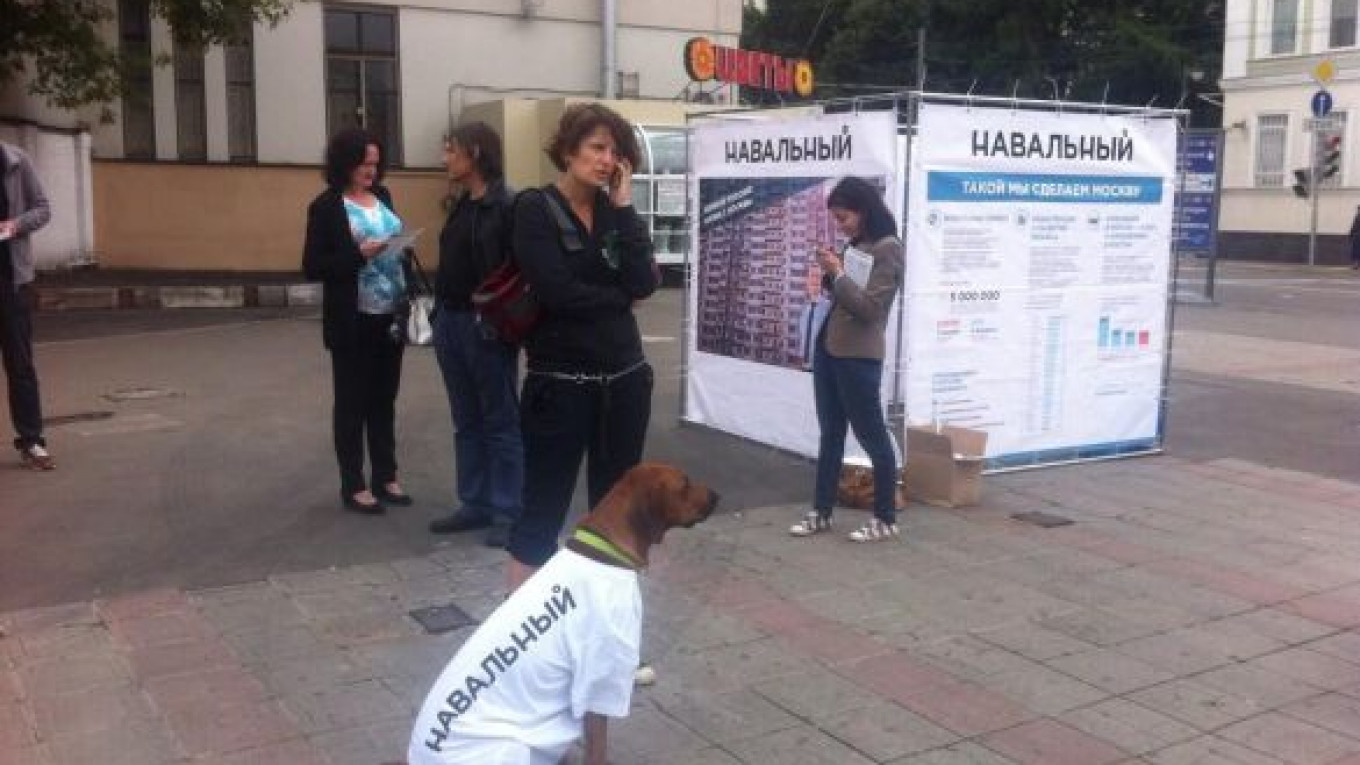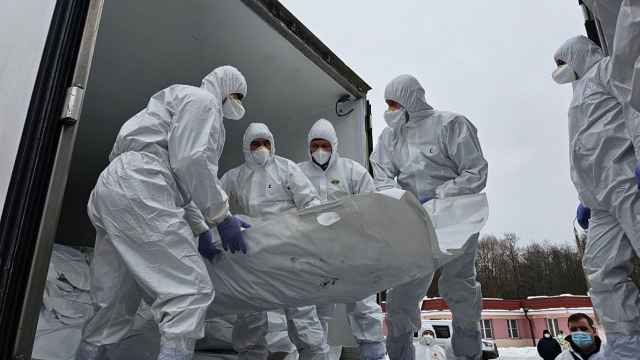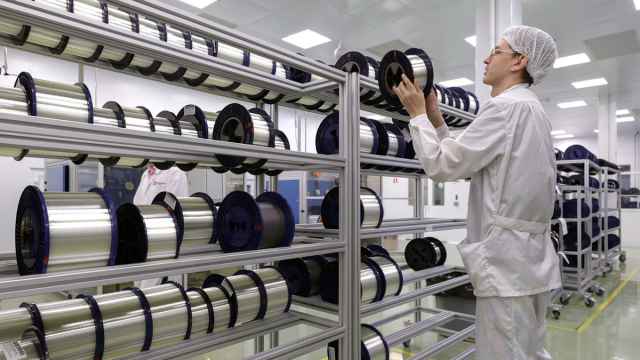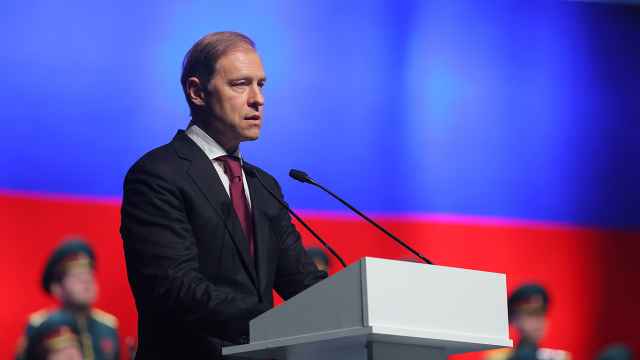More than 30 business owners and top executives have come together in support of opposition mayoral candidate Alexei Navalny in a country where the government has routinely retaliated against such moves.
Businesses have not risked openly backing opposition political leaders since the jailing of former billionaire Mikhail Khodorkovsky in 2003, three years into President Vladimir Putin’s rule.
Now, however, 37 entrepreneurs representing primarily Internet businesses are doing exactly that in an open letter that was made public Wednesday.
“We are concluding a social contract,” said the group’s manifesto, published on the website of online magazine Hopes & Fears. “We expect that Navalny will defend rule of law, support the independence of the judiciary and ensure real accountability of officials to society,” it said.
In exchange, the entrepreneurs vowed to support Navalny’s mayoral campaign financially and vote for him at the September 8 election.
The decision was made at a meeting of the business leaders with the whistleblower that took place on July 24, several days after a regional court in Kirov convicted Navalny and his business partner Pyotr Ofitserov to five and four years in prison, respectively, on charges of embezzlement worth 16 million rubles ($485,000).
The Navalny sentence is a signal to the entire business community that “any entrepreneur can be convicted for buying and selling goods and services,” according to the letter. “In fact, the entire Russian business community has been placed on par with criminals.”
The meeting was initiated by Kamil Kurmakayev and Maxim Faldin, who founded Wikimart, the Russian equivalent of eBay, and gave rise to the idea of a social contract, according to a post by Hopes & Fears that preceded the text of the letter.
The group then sent around the manifesto to their peers, Kurmakayev told Vedomosti. Some jumped onboard, while others refused, saying they either liked the Kremlin-favored incumbent Sergei Sobyanin or feared retribution. Some simply said they were not interested in politics.
“It is often said that businesspeople are above politics,” the manifesto says. “We believe this position is cowardice and hypocrisy.”
Kurmakayev, a Stanford Business School graduate, told Vedomosti that the signatories of the manifesto donated money for Navalny’s campaign as individuals, rather than on behalf of their businesses. The companies include Wikimart, job search portal HeadHunter.ru, online taxi booking service Gettaxi and Internet voting service Votepoller.
The initiative came amid claims by the Central Elections Commission that the candidates running for City Hall can’t use the online paying systems like Yandex.Dengi to finance their campaigns. The commission said that was a violation of election law.
Mikhail Ivanov, a co-founder of publishing house Mann, Ivanov and Ferber, said he wanted to support Navalny in a way other than just casting his vote for him at the election, so signing the social contact was “a good way” to do so.
However, Ivanov was unsure about the possible implications of the move for his business, which he said are “hard to predict.”
But Yelena Masolova, the founder of online business courses Eduson.tv and Darberry — the Russian equivalent of deal-of-the-day services website Groupon — was more confident. She said Navalny’s prison sentence was “the last drop” that encouraged her to speak out openly.
“The only thing we have to fear is fear itself. My only fear is to quail and keep silent,” she said. “It’s unacceptable for me that I work hard while officials slack off at work. Where do the taxes paid by my companies go to — the tile and Sochi Olympics priced as 25 [construction] projects on Manhattan?”
Masolova, 28, referred to Moscow Mayor Sergei Sobyanin’s controversial project to replace asphalt in the city with tile, on which 2 billion rubles was spent in 2011, and the $50 billion preparation for 2014 Winter Olympics, which are already the most expensive in the history of the games.
The support by the civic-minded IT businesses is a good PR stunt for Navalny, who could make use of it to win the support of a broader electorate, as the election campaign in entering the final stage, said Alexei Mukhin, director of the Center of Political Information.
The anti-corruption blogger called the initiative “the first significant political gesture by businesses in the country,” while most businessmen stay tight-lipped, since they are scared to fall under disgrace with the Kremlin.
In contrast to the state-controlled oil and gas sector, the IT business is “the only independent industry” that independent politicians can rely on, Navalny told Slon.ru Wednesday.
The businessmen who signed the manifesto said that the IT industry is based on competence and added intellectual value, not on oil profit margins.
“[The Internet industry] is independent and mobile is and at the same time despised by the authorities that do not recognize businesses where they can’t arrange cushy jobs for their children with a $1 million wage,” Navalny wrote Wednesday in a LiveJournal post. “ ... Honest and independent politics must be based on honest and independent business.”
Big businesses have traditionally enjoyed support from the authorities, with senior owners of Russia’s largest companies — many of which are widely known as Putin’s close allies — refraining from openly expressing their political views or criticizing government policies.
In the open letter in support of Navalny, the business leaders pointed out that “thousands of entrepreneurs had been sent to jail on fabricated charges.”
In the most high-profile case, chief executive of oil giant Yukos Mikhail Khodorkovsky is widely believed to have been prosecuted for political motives.
The tycoon’s jail term was cut by two months earlier this week to leave him in prison until August 2014.
The oil tycoon was arrested on accusations on tax evasion and fraud in 2003 after falling out with Putin. Then-Prime Minister Mikhail Kasyanov later said Putin had told him that Khodorkovsky was financing the Communist Party without asking for the president’s permission.
In a rare move, a group of 16 businessmen and public figures openly supported Navalny last year by donating a total of 4.4 million rubles to his Foundation for Fighting Corruption.
The list of the sponsors that was published by the foundation included strategic development director of Alfa Group Alexei Savchenko, head of National Reserve Corporation Alexander Lebedev and former rector of the New Economic School Sergei Guriev.
Navalny said Wednesday that he would continue efforts to raise funding from businesses and that talks with “various investment bankers” are already underway. He added that he expects the initiative by the 37 entrepreneurs to encourage donations from other businessmen.
But Mukhin pointed out that big companies are unlikely to follow suit. “Big business doesn’t need it. It feels good under the current regime,” he said.
Several dozens of Orthodox activists on Wednesday picketed Navalny’s campaign headquarters to protest against his recent statement that gay pride parades should not be banned, Interfax reported.
One of the activists, Dmitry Enteo, was detained by police.
Contact the authors at [email protected] and [email protected]
A Message from The Moscow Times:
Dear readers,
We are facing unprecedented challenges. Russia's Prosecutor General's Office has designated The Moscow Times as an "undesirable" organization, criminalizing our work and putting our staff at risk of prosecution. This follows our earlier unjust labeling as a "foreign agent."
These actions are direct attempts to silence independent journalism in Russia. The authorities claim our work "discredits the decisions of the Russian leadership." We see things differently: we strive to provide accurate, unbiased reporting on Russia.
We, the journalists of The Moscow Times, refuse to be silenced. But to continue our work, we need your help.
Your support, no matter how small, makes a world of difference. If you can, please support us monthly starting from just $2. It's quick to set up, and every contribution makes a significant impact.
By supporting The Moscow Times, you're defending open, independent journalism in the face of repression. Thank you for standing with us.
Remind me later.






